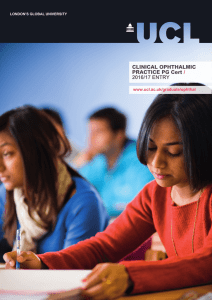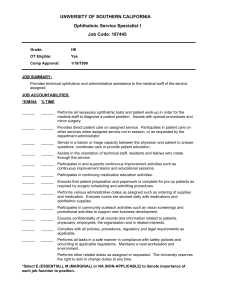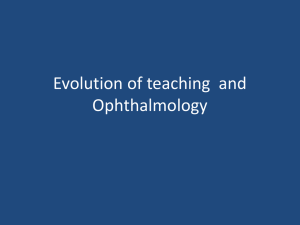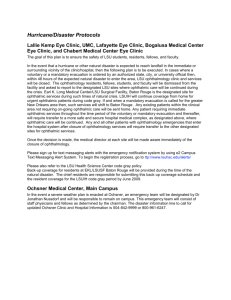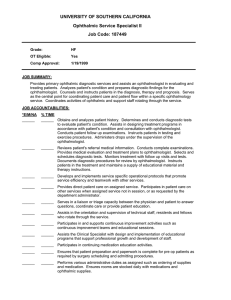PROGRAMME SPECIFICATION Programme title: Final award (BSc, MA etc):
advertisement
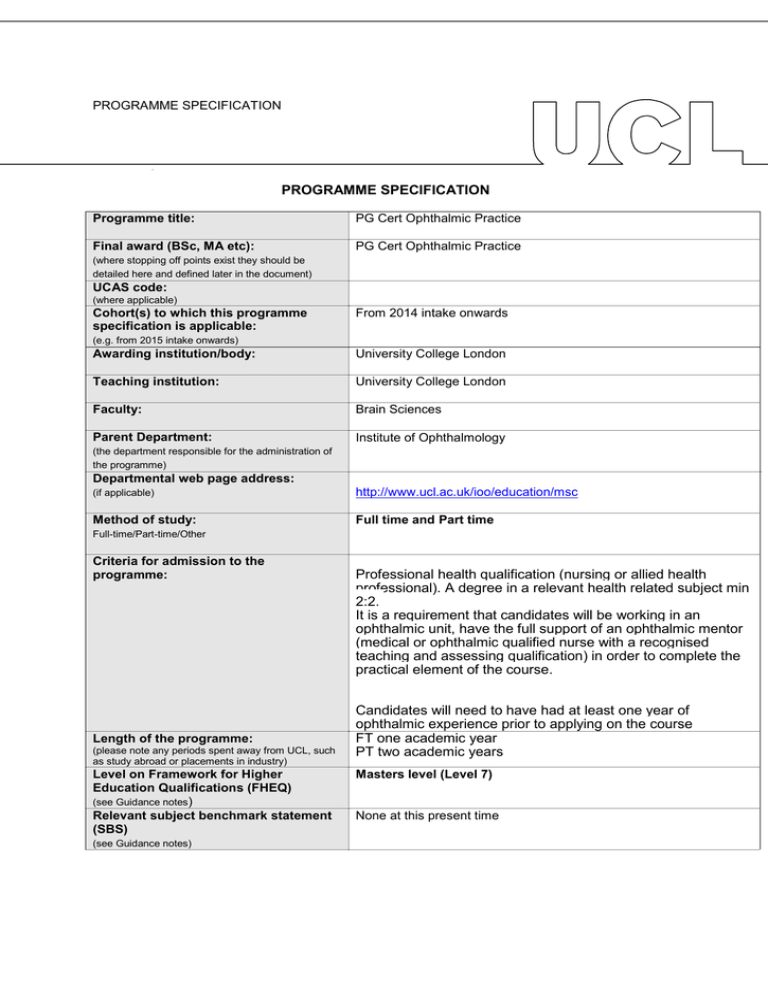
PROGRAMME SPECIFICATION PROGRAMME SPECIFICATION Programme title: PG Cert Ophthalmic Practice Final award (BSc, MA etc): PG Cert Ophthalmic Practice (where stopping off points exist they should be detailed here and defined later in the document) UCAS code: (where applicable) Cohort(s) to which this programme specification is applicable: From 2014 intake onwards (e.g. from 2015 intake onwards) Awarding institution/body: University College London Teaching institution: University College London Faculty: Brain Sciences Parent Department: Institute of Ophthalmology (the department responsible for the administration of the programme) Departmental web page address: (if applicable) http://www.ucl.ac.uk/ioo/education/msc Method of study: Full time and Part time Full-time/Part-time/Other Criteria for admission to the programme: Length of the programme: (please note any periods spent away from UCL, such as study abroad or placements in industry) Level on Framework for Higher Education Qualifications (FHEQ) (see Guidance notes) Relevant subject benchmark statement (SBS) (see Guidance notes) Professional health qualification (nursing or allied health professional). A degree in a relevant health related subject min 2:2. It is a requirement that candidates will be working in an ophthalmic unit, have the full support of an ophthalmic mentor (medical or ophthalmic qualified nurse with a recognised teaching and assessing qualification) in order to complete the practical element of the course. Candidates will need to have had at least one year of ophthalmic experience prior to applying on the course FT one academic year PT two academic years Masters level (Level 7) None at this present time Brief outline of the structure of the programme and its assessment methods: (see guidance notes) This course will allow students to develop an in-depth understanding of the field of ophthalmic practice which is tailored to the area of practice that the student is working in. Students will graduate with an in-depth knowledge of the causes of pathological eye conditions from a physiological perspective and how that links to assessment, diagnosis and therapies in their clinical practice. Additionally, students will develop critical thinking with regard to research studies in this area and acquire an understanding of the various methodologies, governance and ethical considerations related to clinical research. The course may be taken either as a full-time one year course, or as a part-time programme over two academic year. Each module is worth 15 credits Students will commence the course with a module on anatomy and physiology of the eye which will enable them to understand how the physiology relates to ophthalmic pathology and conditions. The second module is an introduction to research methods and statistics, as it is essential for any health care professional to be able to perform basic research and be able to interpret results from empirically- based peer reviewed journal articles. This critical evaluation will enable students to adopt best evidence based practice in their clinical work. The third module introduces student to an array of common and less common eye conditions in the form of clinical case studies relating to ophthalmic pathology. This will allow students to broaden and deepen their knowledge of clinical conditions, assessment and diagnosis and therapeutic interventions. The case studies will be developed from the vast array of material that Professor Sue Lightman has acquired over the last two decades of working at Moorfields Eye Hospital and the Institute of Ophthalmology. The final module is work-based and relates to and assesses students’ acquisition of specific clinical skills vital to their particular clinical work in Ophthalmology. Students will complete a skills portfolio which requires them to demonstrate generic core skills in ophthalmic practice and then more advanced skills in relation to their ophthalmic specialisation, under supervision by their mentor in their home hospital, plus a reflective portfolio. Board of Examiners: Name of Board of Examiners: MSc Clinical Ophthalmology Professional body accreditation (if applicable): N/A Date of next scheduled accreditation visit: EDUCATIONAL AIMS OF THE PROGRAMME: Students will acquire the underpinning knowledge related to pathological ophthalmic conditions, develop core generic assessment and diagnosis skills and advanced skills in their speciality. In addition, students will also develop analytic skills which will enable them to adopt a more evidence based practice and consequently improve their clinical care and the patient experience. Student will be taught by internationally recognised experts in the field of ophthalmic care from the institute of Ophthalmology and Moorfields Eye hospital offering a unique educational experience. PROGRAMME OUTCOMES: The programme provides opportunities for students to develop and demonstrate knowledge and understanding, qualities, skills and other attributes in the following area A: Knowledge and understanding Knowledge and understanding of: Teaching/learning methods and strategies: 1. Anatomy and Physiology of the eye relating to ophthalmic disease 2. Research and statistics relating to ophthalmic care 3. Interpretation of results in research papers 4. Underpinning knowledge base of skills acquisition and the interpretation of their results 5. Acquisition of underpinning knowledge base required to perform clinical skills and the interpretation of their results Workshops in which students work together on research problems Seminars Student-led presentations Video case studies Individual tutorials Completion of coursework assignments Completion of work book Completion of supplementary reading and materials on line via Moodle. Assessment: To include: On line assessments Multiple choice questions Case study presentations B: Skills and other attributes Intellectual (thinking) skills: 1. Understand the biological, physiological , psychological approaches to ophthalmic pathology and how these may be related to ophthalmic practice 2. Synthesise findings from different research studies and approaches with clinical knowledge to achieve an integrated understanding of ophthalmic pathology and management of their conditions 3. Formulate coherent and significant questions on relevant ophthalmic Teaching/learning methods and strategies: Students will be encouraged to develop these skills throughout: Workshops in which students work together on problems and/or complete practical tasks Seminars Student-led presentations Individual tutorials Completion of coursework assignments, especially essays and research reports. research, relating to the clinical management and service delivery and policy, based on awareness of the current status of knowledge in the field. 4. Understand the various perspectives on ophthalmic care and research, including those of service users, carers, clinicians and service planners. Assessment: MCQs Essays Case Study analyses Case Study presentations Research Methods coursework C: Skills and other attributes Practical skills (able to): All students will acquire the following skills: 1. History taking 2. Examination of the patient 3. Use of equipment pertinent to the area that the student practices Teaching/learning methods and strategies: These practical skills will be develop and demonstrated throughout the course by methods including: - - - Participation group discussions at seminars Practical workshops at which a range of these skills are applied Meetings with researchers, clinicians and service users in mental health Verbal and poster presentations on a range of research and clinical topics. Writing and analytical skills will be applied throughout coursework assignments and in unseen exam. Assessment: Completion of a clinical skills book relevant to the area D: Skills and other attributes Transferable skills (able to): 1. 2. 3. 4. 5. 6. Learn actively and effectively Use appropriate interpersonal communication skills Manage time and exercise self discipline to complete substantial pieces of work efficiently Work independently and show initiative Maintain principles and practices of patient confidentiality Use support of supervisors, tutors and peers effectively Teaching/learning methods and strategies: These skills will be developed throughout the course. Coursework will involve both written presentations and some oral presentations, ensuring that a full range of communication skills are employed. 7. 8. 9. 10. 11. 12. 13. Communicate effectively verbally and in writing Communicate confidently and sensitively with service users, carers, clinicians and researchers in the Ophthalmic setting but also with the multi- disciplinary team Show an appropriate professional attitude towards patients and colleagues Listen to others and give and receive feedback constructively. Present and defend ideas to others in coherent and convincing way Develop cooperative network with supervisors and peers Analyse published evidence in balanced way, taking overall context into account. Assessment: These skills are partly assessed in the reflective portfolio in the Clinical Care in Practice module. The ability to analyse empirical studies will be assessed in the Research Methods and Statistics written coursework. The following reference points were used in designing the programme: the Framework for Higher Education Qualifications: (http://www.qaa.ac.uk/en/Publications/Documents/Framework-Higher-Education-Qualifications-08.pdf); the relevant Subject Benchmark Statements: (http://www.qaa.ac.uk/assuring-standards-and-quality/the-quality-code/subject-benchmark-statements); the programme specifications for UCL degree programmes in relevant subjects (where applicable); UCL teaching and learning policies; staff research. Please note: This specification provides a concise summary of the main features of the programme and the learning outcomes that a typical student might reasonably be expected to achieve and demonstrate if he/she takes full advantage of the learning opportunities that are provided. More detailed information on the learning outcomes, content and teaching, learning and assessment methods of each course unit/module can be found in the departmental course handbook. The accuracy of the information contained in this document is reviewed annually by UCL and may be checked by the Quality Assurance Agency. Programme Organiser(s) Name(s): Professor Julie Evans Helen Gibbons Aine Feeny Date of Production: 4th November 2013 Date of Review: October 2014 Date approved by Head of Department: October 2014 Date approved by Chair of Departmental Teaching Committee: Date approved by Faculty Teaching Committee October 2014 November 2014
